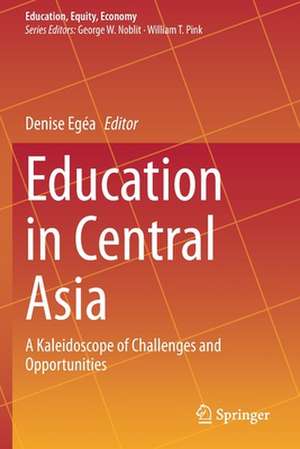Education in Central Asia: A Kaleidoscope of Challenges and Opportunities: Education, Equity, Economy, cartea 8
Editat de Denise Egéaen Limba Engleză Paperback – 16 sep 2021
Since gaining their independence in 1991, the five republics of Central Asia have been undergoing some enormous political, social, linguistic, cultural, and economic changes, even as we write. This collection shows that researchers are increasingly interested in exploring the development of education in this part of the world. In thesecountries, education plays a significant role in transitioning from centrally planned to market economies and is seen as the key resource to facilitate entry into the global competitiveness sphere. This book will be of particular interest to educators, researchers, and policy makers engaged in research or with a particular interest in curricula, and education systems and reforms, and to undergraduate and graduate students studying and researching education in Central Asia or in other post-Soviet contexts.
| Toate formatele și edițiile | Preț | Express |
|---|---|---|
| Paperback (1) | 636.94 lei 6-8 săpt. | |
| Springer International Publishing – 16 sep 2021 | 636.94 lei 6-8 săpt. | |
| Hardback (1) | 643.16 lei 6-8 săpt. | |
| Springer International Publishing – 15 sep 2020 | 643.16 lei 6-8 săpt. |
Preț: 636.94 lei
Preț vechi: 749.34 lei
-15% Nou
Puncte Express: 955
Preț estimativ în valută:
121.92€ • 132.47$ • 102.48£
121.92€ • 132.47$ • 102.48£
Carte tipărită la comandă
Livrare economică 21 aprilie-05 mai
Preluare comenzi: 021 569.72.76
Specificații
ISBN-13: 9783030501297
ISBN-10: 3030501299
Ilustrații: XXII, 202 p. 13 illus.
Dimensiuni: 155 x 235 mm
Greutate: 0.32 kg
Ediția:1st ed. 2020
Editura: Springer International Publishing
Colecția Springer
Seria Education, Equity, Economy
Locul publicării:Cham, Switzerland
ISBN-10: 3030501299
Ilustrații: XXII, 202 p. 13 illus.
Dimensiuni: 155 x 235 mm
Greutate: 0.32 kg
Ediția:1st ed. 2020
Editura: Springer International Publishing
Colecția Springer
Seria Education, Equity, Economy
Locul publicării:Cham, Switzerland
Cuprins
Chapter 1. Introduction – Central Asia: “The Land beyond the River”.- Chapter 2. Variations in Educational Quality in Kyrgyzstan by District and Language of Instruction: An Analysis of 2017 National Scholarship Test Results.- Chapter 3. Understanding Language-in-Education Policy in Kazakhstan: “Trilingual” in Policy, Bilingual in Practice?.- Chapter 4. Educational Reforms in Turkmenistan: Good Framework, Bad Content?.- Chapter 5. Gender and Education in Tajikistan in the Pre-Soviet, Soviet, and Post-Soviet Eras .- Chapter 6. Improving Funding for Higher Education Institutions in Uzbekistan Based on Best Practices.- Chapter 7. Issues of Globalization and Higher Education in Tajikistan.- Chapter 8. A Narrative Study of International Students’ Sense of Belonging in Kazakhstan: Implications for Higher Education Institutions.- Chapter 9. Urban Education and Teacher Policy in the Kyrgyz Republic.- Chapter 10. Descendants of Altynay: Education as an Opportunity and Urban Idealisation in Present-day Kyrgyzstan.- Chapter 11. Urban Education: Challenges and Possibilities.
Notă biografică
Denise Egéa is Professor Emeritus and former Director of the French Education Center for Research, Louisiana State University, USA. She holds the position of Professor, Graduate School of Education, Nazarbayev University, Kazakhstan. She is a Fellow in the Philosophy of Education Society, a Phi Kappa Phi Scholar, and an Officier dans l’Ordre des Palmes Académiques. Her main research interests include Ethico-political issues in education; diversity and equity; languages, cultures, intercultural communication; and human, cultural, and linguistic rights. She has over 100 publications, including two main books: Derrida & Education and Levinas and Education.
Textul de pe ultima copertă
This book brings together internationally prominent scholars renowned for their work on post-Soviet republics, as well as outstanding emerging scholars native of Central Asia in order to discuss the state of education in the Central Asian Republics of Kazakhstan, Kyrgyzstan, Tajikistan, Turkmenistan, and Uzbekistan. Drawing on their individual contexts and research, the authors offer analyses and critiques of some of the social, political, and economic issues in education in their respective countries, and some insights about how local actions engage with the challenges and problems, as well as with the possibilities and opportunities they face.
Since gaining their independence in 1991, the five republics of Central Asia have been undergoing some enormous political, social, linguistic, cultural, and economic changes, even as we write. This collection shows that researchers are increasingly interested in exploring the development of education in this part of the world. In thesecountries, education plays a significant role in transitioning from centrally planned to market economies and is seen as the key resource to facilitate entry into the global competitiveness sphere. This book will be of particular interest to educators, researchers, and policy makers engaged in research or with a particular interest in curricula, and education systems and reforms, and to undergraduate and graduate students studying and researching education in Central Asia or in other post-Soviet contexts.
Since gaining their independence in 1991, the five republics of Central Asia have been undergoing some enormous political, social, linguistic, cultural, and economic changes, even as we write. This collection shows that researchers are increasingly interested in exploring the development of education in this part of the world. In thesecountries, education plays a significant role in transitioning from centrally planned to market economies and is seen as the key resource to facilitate entry into the global competitiveness sphere. This book will be of particular interest to educators, researchers, and policy makers engaged in research or with a particular interest in curricula, and education systems and reforms, and to undergraduate and graduate students studying and researching education in Central Asia or in other post-Soviet contexts.
Caracteristici
Analyses and critiques of social and political issues in education in their respective countries Presents original texts on education in all five Central Asian Republics including Turkmenistan and Uzbekistan Contains work from prominent scholars, and from outstanding emerging scholars from Central Asia









